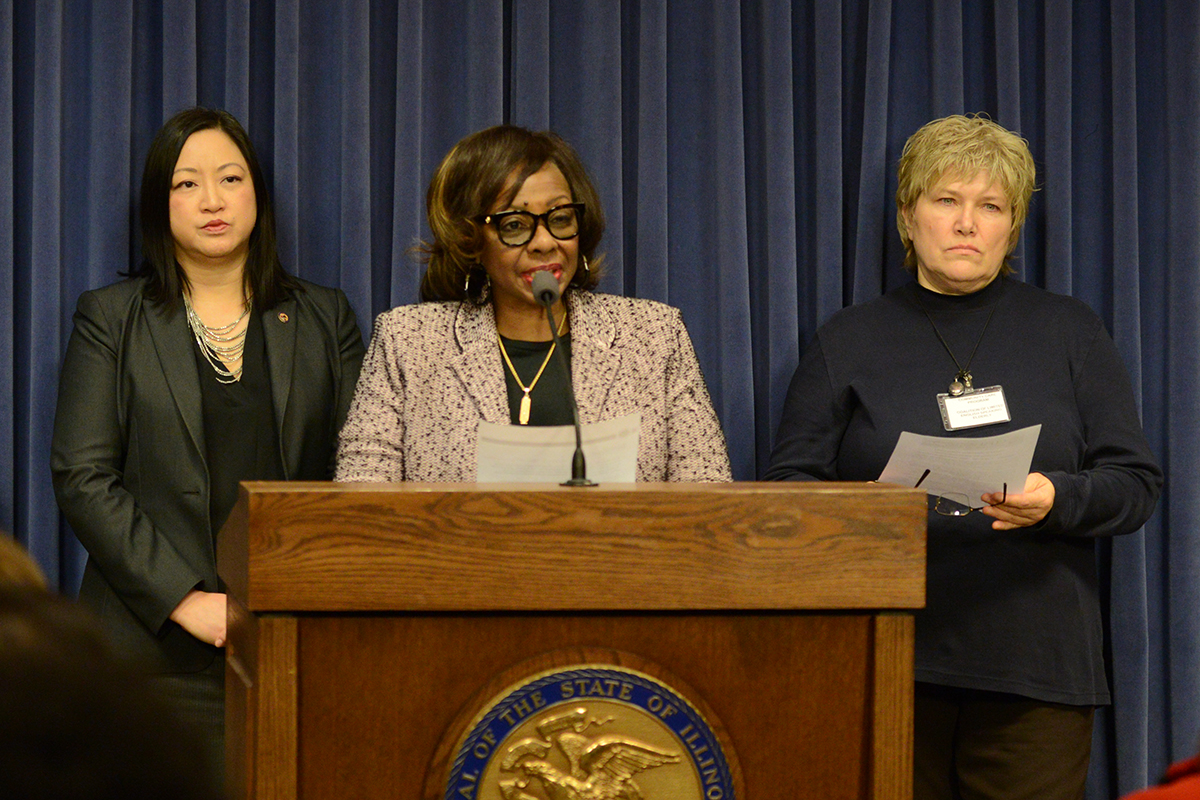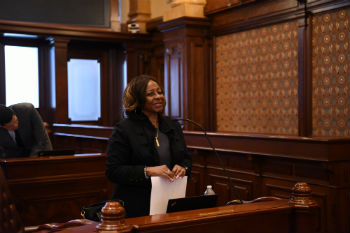Hunter: In-home care workers deserve a raise
- Details
- Category: News

For eight years, funding for programs under the Illinois Department on Aging’s Community Care Program have gone unchanged, which leaves care providers unable to raise workers’ wages and has left Illinois unprepared to deal with workforce shortages.
Currently, the average Illinois home care worker’s hourly wage is only $11.08. Senate Bill 2019 would provide a rate increase to agencies that will ensure every care aid working through the Community Care Programs earns at least $13 per hour by July 1, 2019.
“These workers deserve more than a two-dollar increase in their wages. They deserve our thanks, and our deepest appreciation for their hard work and high spirits. We have to take care of the people who take care of one of our most vulnerable communities, and Senate Bill 2019 helps us do just that,” Hunter said.
Hunter: Governor’s proposed budget a positive starting point for stability in Illinois
- Details
- Category: News
 SPRINGFIELD – State Senator Mattie Hunter (D-Chicago, 3rd) issued the following statement in response to Governor JB Pritzker’s proposed budget for the upcoming year:
SPRINGFIELD – State Senator Mattie Hunter (D-Chicago, 3rd) issued the following statement in response to Governor JB Pritzker’s proposed budget for the upcoming year:
“This budget is a more positive starting point than has been the case in recent years. I am encouraged to see thoughtful initiatives in Governor Pritzker’s proposed budget that will help restore stability in Illinois.
“The Governor’s investments in childhood education, workforce development and restorative justice efforts gives me positive assurance that we can all work together towards creating better educational opportunities for our students, more quality jobs in our communities and keeping our young people from entering the criminal justice system.
Senator Hunter champions measure to increase unfair low wages
- Details
- Category: News
 SPRINGFIELD – In an effort to improve wages for the state’s lowest paid workers, State Senator Mattie Hunter (D-Chicago, 3rd) voted in support of a minimum wage increase Thursday.
SPRINGFIELD – In an effort to improve wages for the state’s lowest paid workers, State Senator Mattie Hunter (D-Chicago, 3rd) voted in support of a minimum wage increase Thursday.
Hunter is a chief co-sponsor of Senate Bill 1, which would gradually raise Illinois’ minimum wage to $15 per hour by January 2025. The step-by-step rollout of the increase is designed to allow businesses to adjust to the law and adapt accordingly.
“We have talked long enough about putting Illinois on a responsible path to $15 minimum wage and today is the first step along that path,” Hunter said. “This will allow millions of workers in our state to provide for themselves and their families.”
While the cost of living has increased significantly, Illinois’ minimum wage has remained at $8.25 per hour since 2010. The minimum wage has become the primary source of income for some families, even people living above the poverty line are still facing tough economic times.
“We’re giving working families the raise and providing the stability they deserve,” Hunter said. “This puts us on the right trajectory to helping people in our state move their lives forward.”
Senate Bill 1 passed by a vote 39-12 and now moves to the House for consideration.
Hunter: ‘Gun dealer licensing will save lives, keep communities safe’
- Details
- Category: News
CHICAGO–State Senator Mattie Hunter issued the following statement this morning in response to Gov. Pritzker signing the Combating Illegal Gun Trafficking Act.
Hunter (D-Chicago 3rd) co-sponsored Senate Bill 337, which would require gun dealers to adopt responsible practices and would hold corrupt dealers accountable. The new law is intended to curb a major source of illegally trafficked firearms from entering Illinois communities:
“Senseless gun violence is devastating neighborhoods in Chicago and throughout the state each and every day, and I applaud the governor for taking immediate action to fight gun violence and protect our children and our families.
“While no single reform will end Illinois gun violence by itself, the Gun Dealer Licensing Act is a start. It will help crack down on the handful of gun dealers who are abusing the process and will encourage businesses to adopt reasonable, sensible and good practices that will save lives, improve public safety and keep our communities safe.”
More Articles …
Page 94 of 143


